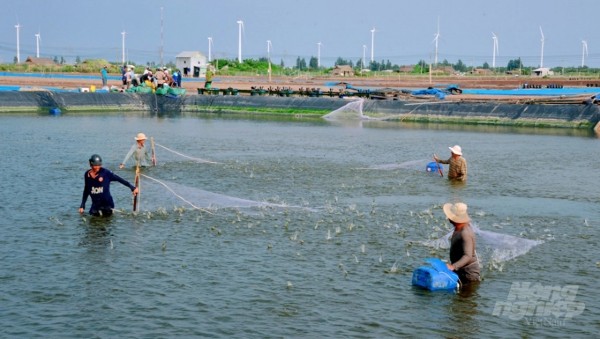May 21, 2025 | 07:16 GMT +7
May 21, 2025 | 07:16 GMT +7
Hotline: 0913.378.918
May 21, 2025 | 07:16 GMT +7
Hotline: 0913.378.918
At the conference, Deputy Minister of Agriculture and Rural Development Phung Duc Tien emphasized: Under the pressure of waste pollution, the pollution in the farming and livestock sectors is extremely serious. Therefore, it is particularly crucial to implement the prevention of aquatic diseases.
Developing a national aquatic disease prevention plan, and conducting that national plan to prevent aquatic diseases for the period 2021-2025 is an urgent task for the fisheries sector.
In the first 10 months of 2020, more than 41,980 hectares of aquaculture areas were damaged, which is 1.91 times higher than the same period in 2019. Brackish water shrimp farming was the most damaged with more than 39,000 hectares, said Mr. Nguyen Van Long, Deputy Director of the Department of Animal Health.
In addition, more than 1,000 hectares of pangasius have been destroyed, which accounts for an increase of 16.46 times over the same period last year. Acute hepatopancreatic necrosis disease, white spots, red body, white feces, intestinal were reported as the main diseases in brackish water shrimp... Meanwhile, liver, kidney disease, parasitic diseases have become threats to pangasius industry. Accordingly, the general and specific goals for the national plan to prevent dangerous aquatic diseases in the next 5 years should be focused on the prevention of dangerous diseases on some key aquatic products including shrimp, pangasius, lobster, salmon, tilapia, and clam.
The specific goals include: controlling the rate of infected areas under 3% of the total farming areas; actively monitoring dangerous pathogens that cause serious illness, epidemiological mapping of diseases distribution; effectively preventing new dangerous diseases; improving the quality of aquatic diseases control and prevention; and building at least five disease-free chains of shrimp and pangasius.
This draft plan will be consulted for finalization before MARD’s submission to the Prime Minister to issue a Decision applied for the next 5-year period.

Agricultural Service Centers have been established in some provinces, which broke the veterinary system’s operation. Photo: Le Hoang Vu.
To manage the aquatic disease situation, the Department of Animal Health and Department of Livestock Production should develop an annual plan for training and information dissemination to local veterinary staff and aquatic farmers. Every year, the samples of aquatic products should be collected for disease testing as of given regulations, so as to enhance the monitoring of resources of aquatic farming. Dangerous diseases such as viral diseases in brackish water shrimp and white spots in the internal organs should be controlled, Deputy Director of Can Tho Department of Agriculture and Rural Development Pham Truong Yen commented.
Deputy Minister Phung Duc Tien highly appreciated the preparation of the Department of Animal Health and the feedback of the local authorities. Some provinces have established the Agricultural Service Centers which broke the original veterinary service system’s operation. During this period, the Ministry of Agriculture and Rural Development has sent dispatches to provincial governments to suspend such establishment and even questioned the Minister of the Interior about this issue. It is expected that the veterinary system will be re-established. Currently, some provinces have re-established the veterinary system following veterinary law.
Author: Ngoc Thang - Hoang Vu. Translated by Meagan Phan. Edited by Duc Huy.

(VAN) Japan's grant aid project contributes to capacity building, promoting organic agricultural production, and fostering sustainable community development in Dong Thap province.

(VAN) For years, the CRISPR-Cas9 genome technology has been reshaping genetic engineering, a precision tool to transform everything from agriculture to medicine.

(VAN) Vietnam aims to become a 'leader' in the region in the capacity and managing effectively soil health and crop nutrition.
![Reducing emissions from rice fields: [Part 1] Farming clean rice together](https://t.ex-cdn.com/nongnghiepmoitruong.vn/608w/files/news/2025/05/05/z6509661417740_a647202949c539012a959e841c03e1d3-nongnghiep-143611.jpg)
(VAN) Growing clean rice helps reduce environmental pollution while increasing income, allowing farmers to feel secure in production and remain committed to their fields for the long term.
/2025/05/19/5136-1-144800_230.jpg)
(VAN) The Nghe An Provincial People's Committee has just approved the list of beneficiaries eligible for revenue from the Emission Reductions Payment Agreement (ERPA) in the North Central region for the year 2025.

(VAN) 14 out of 35 domesticated elephants in Dak Lak province have had their living conditions improved, with 11 of them currently participating in the non-riding elephant tourism model.

(VAN) Muong Nhe Nature Reserve hopes that being upgraded to a national park will lay the foundation for forest protection efforts to be carried out in a systematic, modern, and sustainable manner.